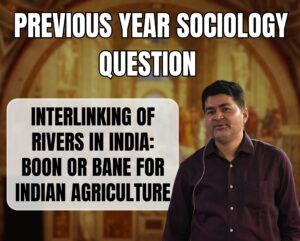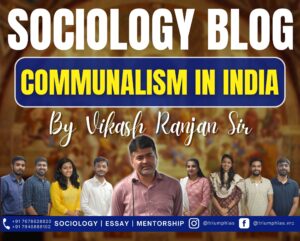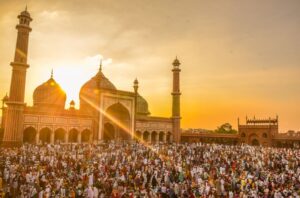What are the distinct features of Islam as practiced in India, how have they changed over time?
Section: A
Sociology Paper 2017
(Relevant for Sociology Optional for Civil Services Examination)
Paper 2: Unit 12 Social Structure; Religion and Society
Question: What are distinct features of Islam as practiced in India, how have they changed over time?
– 10 Marks
|
Introduction: Basic Premises of Change in ISLAM in India Main Body: Distinct Features of Islam as Practiced in India, Changes Over Time Conclusion: On the Line of Pluralism in India |
Introduction
Islamic practices have altered in INDIA due to assimilation with pluralistic Indian cultures and traditions. Due to integration of two great traditions of Hindusim and Islam there has been exchange of cultures, norms and rituals. Also secular constitution and uniform legal system has also caused changes in Islam.
Main Body:
Distinct Features of Islam as Practiced in India:
- Syncretism and Diversity: Islam in India reflects a rich syncretic tradition, blending elements of Sufism, local cultural practices. This diversity is evident in the variety of Islamic sects, schools of thought, and rituals practiced.
- Sufi Influence: Sufism has played a significant role in Indian Islam, emphasizing spiritualism, tolerance, and inclusivity. Sufi saints have attracted large followings and have contributed to the spread of Islam through peaceful and harmonious means.
- Cultural Integration: Islam in India has integrated with the country’s diverse cultural fabric. This is evident in architecture (Indo-Islamic styles), cuisine (Mughlai and other regional cuisines), and music (Qawwali and Sufi music).
- Caste based structures: there has been found caste like distinctions and discriminations in Indian Muslim community making it unique feature of Indian Islam. There has been demand from within of community to recognise the caste.
- Madrasa Tradition: India has a strong tradition of Islamic education with madrasas serving as centres of religious learning. These institutions provide religious and secular education to Muslim students. However in India madrasas also controlled by secular state authority. At the same time they are not only religiously protected but enjoys constitutional protection too.
- Language Diversity: Urdu and Arabic are significant languages in Islamic practice, with Urdu being widely spoken and having a rich literary tradition. Indian Muslims speaks various languages based on their regional languages, not limited to Urdu and Arabic. North Indian Muslim may be speaking Hindi and a Muslim in Kerala might be speaking Malayalam.
- Personal Laws: India allows its Muslim citizens to follow Islamic personal laws in matters of marriage, divorce, and inheritance. This has led to differences in family law for Muslims compared to other communities in India. Similarly there has been legaln changes too for example recent ban on triplem talaq.
- Inter religious marriage is not practiced in typical Islam but in India such marriage are legal.
Changes Over Time:
- Modernization: With India’s modernization and urbanization, there has been a shift in lifestyle and values among some Muslims. Many have embraced education, careers, and contemporary lifestyles while maintaining their faith.
- Political Movements: The Indian Muslim community has been influenced by various political movements and leaders advocating for their rights and representation. This has led to greater political awareness and activism.
- Globalization: Increased exposure to global trends and ideas has influenced the practice of Islam in India, leading to greater diversity and sometimes tension between traditional and modern interpretations.
- Secularism: India’s commitment to secularism has influenced the public role of religion, including Islam. While personal faith remains strong, there is a clear distinction between religious and secular domains.
- Interfaith Relations: Interactions with people of other faiths in India have led to greater religious tolerance and dialogue. Many Muslims actively engage in interfaith initiatives and promote harmony.
Conclusion
Islam in India is characterized by its syncretic and diverse nature, with distinct features rooted in its historical and cultural context. Over time, it has evolved in response to modernization, political movements, globalization, and the principles of secularism and interfaith relations that define India’s pluralistic society.
Related Blogs …
 |
 |

To master these intricacies and fare well in the Sociology Optional Syllabus, aspiring sociologists might benefit from guidance by the Best Sociology Optional Teacher and participation in the Best Sociology Optional Coaching. These avenues provide comprehensive assistance, ensuring a solid understanding of sociology’s diverse methodologies and techniques.
META TAGS:
Islam in India, Indian Islam, Syncretism, Sufi Influence, Cultural Integration, Madrasa Tradition, Islamic Personal Laws, Modernization, Political Movements, Globalization, Secularism, Interfaith Relations, Pluralism, Social Change, Religion and Society, Islamic Practices, Religious Tolerance, Indian Muslims, Diversity in Islam, Religious Evolution, Cultural Exchange.
Why Vikash Ranjan’s Classes for Sociology?
Proper guidance and assistance are required to learn the skill of interlinking current happenings with the conventional topics. VIKASH RANJAN SIR at TRIUMPH IAS guides students according to the Recent Trends of UPSC, making him the Best Sociology Teacher for Sociology Optional UPSC.
At Triumph IAS, the Best Sociology Optional Coaching platform, we not only provide the best study material and applied classes for Sociology for IAS but also conduct regular assignments and class tests to assess candidates’ writing skills and understanding of the subject.
Choose The Best Sociology Optional Teacher for IAS Preparation?
At the beginning of the journey for Civil Services Examination preparation, many students face a pivotal decision – selecting their optional subject. Questions such as “which optional subject is the best?” and “which optional subject is the most scoring?” frequently come to mind. Choosing the right optional subject, like choosing the best sociology optional teacher, is a subjective yet vital step that requires a thoughtful decision based on facts. A misstep in this crucial decision can indeed prove disastrous.
Ever since the exam pattern was revamped in 2013, the UPSC has eliminated the need for a second optional subject. Now, candidates have to choose only one optional subject for the UPSC Mains, which has two papers of 250 marks each. One of the compelling choices for many has been the sociology optional. However, it’s strongly advised to decide on your optional subject for mains well ahead of time to get sufficient time to complete the syllabus. After all, most students score similarly in General Studies Papers; it’s the score in the optional subject & essay that contributes significantly to the final selection.
“A sound strategy does not rely solely on the popular
Opinion of toppers or famous YouTubers cum teachers.”
It requires understanding one’s ability, interest, and the relevance of the subject, not just for the exam but also for life in general. Hence, when selecting the best sociology teacher, one must consider the usefulness of sociology optional coaching in General Studies, Essay, and Personality Test.
The choice of the optional subject should be based on objective criteria, such as the nature, scope, and size of the syllabus, uniformity and stability in the question pattern, relevance of the syllabic content in daily life in society, and the availability of study material and guidance. For example, choosing the best sociology optional coaching can ensure access to top-quality study materials and experienced teachers. Always remember, the approach of the UPSC optional subject differs from your academic studies of subjects. Therefore, before settling for sociology optional, you need to analyze the syllabus, previous years’ pattern, subject requirements (be it ideal, visionary, numerical, conceptual theoretical), and your comfort level with the subject.
This decision marks a critical point in your UPSC – CSE journey, potentially determining your success in a career in IAS/Civil Services. Therefore, it’s crucial to choose wisely, whether it’s the optional subject or the best sociology optional teacher. Always base your decision on accurate facts, and never let your emotional biases guide your choices. After all, the search for the best sociology optional coaching is about finding the perfect fit for your unique academic needs and aspirations.
Follow us:



Find More Blogs
| Compare and contrast Karl Marx’s and Max weber’s | Karl Marx- Historical Materialism |
| Talcott Parsons : Social system | Scope of the subject and comparison with other social sciences |




